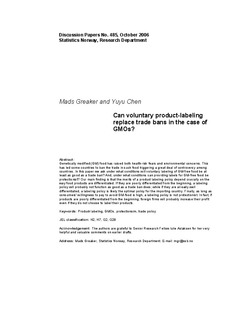Can voluntary product-labeling replace trade bans in the case of GMOs?
Working paper

Åpne
Permanent lenke
http://hdl.handle.net/11250/180641Utgivelsesdato
2006Metadata
Vis full innførselSamlinger
- Discussion Papers [1003]
Sammendrag
Abstract:
Genetically modified (GM) food has raised both health-risk fears and environmental concerns. This
has led some countries to ban the trade in such food triggering a great deal of controversy among
countries. In this paper we ask under what conditions will voluntary labeling of GM-free food be at
least as good as a trade ban? And, under what conditions can providing labels for GM-free food be
protectionist? Our main finding is that the merits of a product labeling policy depend crucially on the
way food products are differentiated. If they are poorly differentiated from the beginning, a labeling
policy will probably not function as good as a trade ban does; while if they are already well
differentiated, a labeling policy is likely the optimal policy for the importing country. Finally, as long as
consumers' willingness to pay to avoid GM-food is high, a labeling policy is not protectionist. In fact, if
products are poorly differentiated from the beginning, foreign firms will probably increase their profit
even if they do not choose to label their products.
Keywords: Product-labeling, GMOs, protectionsim, trade policy